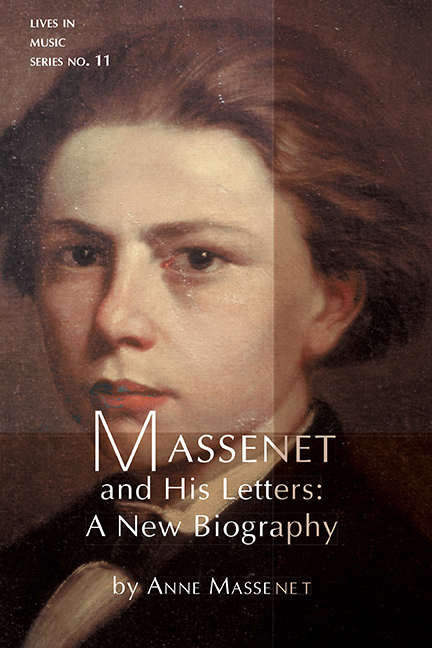Book contents
- Frontmatter
- Contents
- List of Illustrations
- Simplified Genealogy of the Massenet Family
- Foreword
- Dedication
- Translator's Preface
- I Years of Apprenticeship and Roman Adventure
- II The Steps of Quai Conti
- III Notebooks and Sketches
- IV Sybil Sanderson—“The Unique”
- V Massenet's Students
- VI Summer Solitude
- VII The Last Years—Posthumia
- VIII Conclusion
- Massenet: Biographical Chronology
- Bibliography
- About the Author
- Translator's Notes
- About the Translator
- General Index
- Index of Massenet's Works Cited
- Index of Letters Cited
Translator's Preface
- Frontmatter
- Contents
- List of Illustrations
- Simplified Genealogy of the Massenet Family
- Foreword
- Dedication
- Translator's Preface
- I Years of Apprenticeship and Roman Adventure
- II The Steps of Quai Conti
- III Notebooks and Sketches
- IV Sybil Sanderson—“The Unique”
- V Massenet's Students
- VI Summer Solitude
- VII The Last Years—Posthumia
- VIII Conclusion
- Massenet: Biographical Chronology
- Bibliography
- About the Author
- Translator's Notes
- About the Translator
- General Index
- Index of Massenet's Works Cited
- Index of Letters Cited
Summary
The year 2012 marked the centenary of the death of French opera composer Jules Massenet (1842–1912) who, alongside Richard Wagner and Giuseppe Verdi, was one of the most prolific and successful composers of the nineteenth century. His career extended into the twentieth century, and when he died on August 13, 1912, he left three finished operas which would receive their premieres posthumously. Massenet and his lifelong colleague Camille Saint-Saëns were the most performed French composers of their epoch. In both quality and quantity, however, Massenet is the only French operatic composer comparable to a Giacomo Puccini or a Richard Strauss. Massenet composed twenty-seven operas, four oratorios, six cantatas, over two hundred concert songs, and instrumental works including ballets, incidental music, and orchestral suites. He was awarded every possible honor in his field, including the Prix de Rome (1863), the Légion d'Honneur (attaining the highest rank of Grand Officier in 1901), and membership in the Académie des Beaux-Arts of the Institut (1878). From 1878 to 1896, he taught composition at the Paris Conservatoire and, after retiring from that position, continued to mentor a veritable lexicon of the following generation's young composers. In the century following his death, Massenet's operas Manonand Werther,among others, have continued to be regularly performed world-wide. Between his death and its recent centennial in 2012, there has been a continual stream of interest in both his music and in the rich details of his long life.
Massenet has been the subject of numerous biographical monographs in both French and in English. Many biographers include detailed information about his operatic works, including synopses of their plots, production history, and occasionally details of their harmonic analysis. The first biographical monographs appeared before Massenet's death. In France, Eugène de Solenière's Massenet: étude critique et documentaire(1897) and Louis Schneider's, Massenet(Paris: Carteret, 1907) were followed by the first biography in English, Henry T. Finck's Massenet and His Operas(New York: John Lane, 1910). The composer's supposed autobiography, Mes souvenirs, was published in France in 1913. By the end of the 20th century, at least nine more Massenet biographies had been written in French, and two more in English.
- Type
- Chapter
- Information
- Massenet and His LettersA New Biography, pp. xii - xviiiPublisher: Boydell & BrewerPrint publication year: 2015



